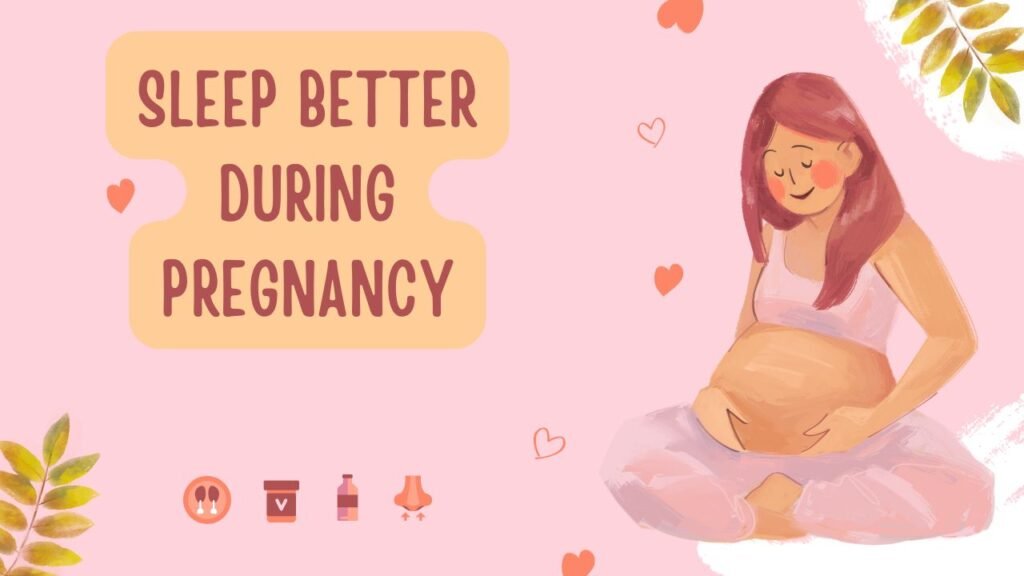Introduction to Sleep Better During Pregnancy
Sleep Better During Pregnancy: There is a lot of change, excitement, and anticipation throughout pregnancy. However, alongside the excitement of the impending arrival of a new life are a multitude of physical, emotional and hormonal changes, many of which can affect sleep.
Insomnia is one of the worst companions that any pregnant woman can have. There are few things worse than the sisyphean struggle to fall asleep only to spend another sleepless night tossing and turning or waking up at four in the morning and thinking, here we go again – except that you also wake up the next morning feeling haggard, anxious and frustrated.
In this blog, we will discuss why insomnia is common during pregnancy, the impact of poor sleep on your health and expert tips to improve sleep during pregnancy.
From aches and pains such as back pain and leg cramps, to hormonal fluctuations disrupting your sleep cycle, to emotional factors that keep you awake at night, we will provide natural remedies and practical solutions to help you sleep on this special time.
Once you finish reading this article, you will have the tools that will allow you to deal with insomnia during pregnancy, and sleep better so that you can wake up rested and ready to dive into your day. Here are some tips for conquering insomnia in pregnancy and getting more sleep.
Investigating Pregnancy Insomnia

What is Pregnancy Insomnia?
Insomnia during pregnancy or pregnancy insomnia is a case of difficult sleeping during pregnancy, usually described as a problem of falling asleep or staying asleep, or waking up too early in the morning.
The second (and narrowing down the third) is hypersomnia – another extremely common sleep disorder among females, especially when they reach the second and third trimesters.
Unfortunately, there are many causes of pregnancy insomnia, which can include not just physical discomfort and hormonal change but also emotional stress or anxiety.
Fatigue because of sleep disturbances can range from subtle to drastic, but even mild pregnancy insomnia can have a powerful effect on a woman`s mood, energy, and quality of life.
As a matter of fact, insomnia during pregnancy is a little more than just frustrating, it has negative effects not just on maternal health, but also the fetal health, leading to irritability, fatigue, or in worse cases, depression.
Reasons for Sleeplessness in Pregnancy
Pregnancy insomnia is triggered by several factors, including. By identifying these factors, you can determine the underlying causes of your sleep disturbances and accordingly address them:
Hormonal Changes
Sleep Better During Pregnancy: When you are pregnant, there are major hormonal changes that occur particularly an uptick in progesterone and estrogen. Hormonal changes also cause different sleep disturbances.
Progesterone (a sedating hormone that increases in pregnancy) is calming, yet its omnipresence can render daytime drowsiness even more intense, thus darkening the path to a consolidated night-time rest.
Physical Discomfort
During pregnancy, your body is undergoing physical changes, including an increasing belly size, back pain, leg cramps, heartburn, etc. all contributing to making it more difficult to sleep in a comfortable position.
In addition, the same pressure that puts on your bladder will also make you go to the bathroom a lot in the middle of the night, you will thus disrupt your sleep.
Frequent Urination
Sleep Better During Pregnancy: Another very common problem with pregnant women is the feeling of having to urinate more often. The expanding uterus pushes on your bladder, where you will feel the need to pee more often, especially at night. So, during sleep you may be disturbed, making it hard to stay asleep.
Anxiety and Stress
While getting pregnant can be one of the most exhilarating and exciting experiences you can have, it can also bring along a lot of anxiety, doubts, and stress.
Your child is born, but you are still worried about how healthy he will be or how the industry in December will soon be forgotten, and how your life will change after the birth of your baby soon, etc (and other similar topics).
In the end, you begin to be disturbed by thoughts, and it is already not so easy to fall asleep. Insomnia is frequently triggered by emotional stress and can increase sleeping trouble.
Restless Legs and Cramps at Night

Restless Legs Syndrome and leg cramps are common during pregnancy especially in the second and third trimesters. These discomforts interrupt sleepiness and can affect the quality of sleep that you experienced, causing insomnia during the summer.
What pregnancy insomnia does to you
Sleep Better During Pregnancy: Insomnia in pregnancy is more than being tired. Continuous sleep interruption can substantially affect your important physical and emotive fitness. So here is how insomnia can influence you throughout pregnancy:
Mood Swings and Irritability
Sleep deprivation is correlated with mood fluctuations, irritability, and even depression. Your hormone changes already make you more sensitive during pregnancy, and you can really zoom in on the emotional highs and lows when you are not resting enough.
Increased Fatigue
Chronic fatigue is one of the most common side effects of pregnancy insomnia. If you are sleep-deprived, you are always going to feel tired, which makes it difficult to spend a day at work, perform hygiene activities and be productive.
Physical Health Issues
Lack of sleep while pregnant may increase the risk of certain complications such as high blood pressure and gestational diabetes. It can also impact your immune system and make you more prone to infections. Moreover, poor sleep can increase your sensitivity to physical pains such as back pain, swelling, and headaches.
Impact on Baby’s Health
Previous research shows that disrupted sleep during pregnancy can disrupt fetal development. Lack of sleep may also lead to premature labor or low birth weight. Getting a good rest not only for yourself but as well for your baby, is very important because of the state you are in.
Ways to Sleep Better During Pregnancy
Sleep Better During Pregnancy: With all that out of the way, what you really want to know are the simple, natural tips on how to sleep better in pregnancy, so let’s crack on with those. Here are some expert-backed strategies to help ease your discomfort, relieve stress, and encourage sleep:
Keep a Regular Sleep Schedule
The internal clock of your body (circadian rhythm) plays a key role in determining your sleep-wake cycle. Going to bed and rising at the same time each day — a simple yet powerful method to get better sleep.
Get as close to the same time to bed and the same time to wake up every single day, including the weekends. Such a routine can create consistency to help your body regulate its sleep cycle and fall asleep and wake up when you want.
Also make sure that you always have a bed time routine that will help your body know when it needs to relax. Just want to relax and forget everything your online business world is providing you right now.
Taking a warm bath, relaxation exercise, or a calm book before your bed would help you with those. Keeping yourself away from Tech usage & stressful activities before bedtime as tech can interrupt natural sleep rhythms of body.
Make Your Sleep Atmosphere Comfortable

Sleep Better During Pregnancy: A restful atmosphere becomes vital for good sleep, particularly due to physical discomfort during pregnancy disturbing sleeping cycles. You should do your best to make your bedroom as comfortable and relaxing as it can be. Consider the following tips:
Get a good quality pillow — A supportive pillow helps with back pain, curing leg cramps, and placement of your growing belly when you sleep, (think a pregnancy pillow or wedge pillow). Side sleeping helps blood flow better and relieves internal organ pressure.
Reduce noise and light: Close blackout curtains to shut out the outside light and consider earplugs or a white noise machine to drown out unwanted sounds.
Engage in relaxation exercises
One of the leading causes of pregnancy insomnia is stress and anxiety, so doing what you can to relax before bed is important. Here are some of the relaxation methods that can help with sleep:
Ongoing mindfulness meditation: A lot of Meditation helps to cleanse your mind and reduces stress. Dedicate even a few minutes before sleeping (if not more) to meditation (10-15 min till a few hours), and it will change how well you sleep.
Pay attention to your breathing, notice your thoughts with no judgment, and let yourself relax.
Progressive muscle relaxation: By gradually tensing and then relaxing specific groups of muscles, this method can help release physical tension for your body.
If your body is tensed up with fear and stress, you can try breathing exercises: Slow, deep breathing relaxes your body and can help your body activate its relaxation response.
You can inhale for four, hold for four, and exhale for four, repeating this cycle several times to relax your nervous system.
Stay Active During the Day
Doing physical activity throughout the day, perhaps regular walks helps to fall asleep during the night time. Just not vigorous exercise right before bed, which makes it more difficult to fall asleep.
Settle for low-impact practices such as walking, swimming, or this just does wonders for relieving discomfort due to pregnancy yoga, and these can help more than we know, with sleep as well.
Exercising in the daytime is additionally a natural way to relieve tension and anxiety and will subsequently make it less difficult to loosen up later in the evening.
Address Physical Discomfort

Through your pregnancy, discomfort is more likely nonetheless there are plenty of approaches to reduce it:
Got pillows: Sleep on your left side, tuck a pillow between your legs and another under your belly to support your growing body. The position allows the organs to be less strain and increases blood circulation.
2: Stretch out: Stretching of the legs, be done before going to bed, will remove cramps and restlessness. For restless leg syndrome, massage your legs, for example, or use a warm compress to help the muscles relax.
Prop your legs up: Swelling is a very common (and annoying) pregnancy symptom, but propping your legs up throughout the day or even while you sleep can help decrease fluid retention and relieve discomfort.
Conclusion
Sleep Better During Pregnancy: The struggle with pregnancy insomnia is real, but you don’t have to live with it forever. With the understanding of why pregnancy is, particularly now, so full of insomnia and integrating these tips that are actually useful, falling asleep can also be an easier process leading to a better wake-up.
Develop a regular sleep pattern, eliminate distractions for a good night sleep environment, exercise outside, or in due course, practice relaxation techniques to sleep better in pregnancy and amp; aid the body; it; s healing.
If sleepless nights just happen again and again, or if sleep overhead affects health, it is best to consult a consul with doctors to exclude pathological conditions.
If you do it right, with a sprinkle of time, you can have peaceful nights and be able to wake up and embrace the new phase of your pregnancy.





